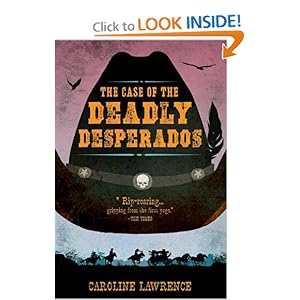We just read The Case of the Deadly Desperados for my daughter’s book club. In the book, the narrator, P.K., is a “half breed” child living in the Old West. After his foster parents are murdered, he is chased around Virginia City by the killers, who want a letter that he has in his possession.
 The most interesting thing about the book was the author’s choice to endow the narrator with what his foster mother called his “Gift” and his “Thorn.” The reader learns from P.K. that his Thorn is that he cannot show or recognize emotions, and that his Gift is his extraordinary memory and ability to do math in his head. Though child readers didn’t really notice it, P.K. is clearly portrayed to be autistic in a time when autism wasn’t recognized.
The most interesting thing about the book was the author’s choice to endow the narrator with what his foster mother called his “Gift” and his “Thorn.” The reader learns from P.K. that his Thorn is that he cannot show or recognize emotions, and that his Gift is his extraordinary memory and ability to do math in his head. Though child readers didn’t really notice it, P.K. is clearly portrayed to be autistic in a time when autism wasn’t recognized.
P.K.’s physical journey in the book is his attempt to keep one step ahead of his pursuers. His emotional journey, however, is one in which he learns to understand both his Gift and his Thorn and how to use them to his advantage.
I was reminded of his Thorn today, when my Thorn (or perhaps, one of many!) reached out and pricked my daughter as she tried to follow directions to make a handmade book. First we had to take apart and restaple the pages that I had put together wrong. Then we had to do it again, because I was distracted and did it wrong in another way. Then, finally, we got it (sort of) right.
Then as she glued down the end papers to the boards that would serve as her hardcover, she said, “Wait. Don’t I have to put down the fabric first?”
Well, yes. That would be the way it’s supposed to be done. But somehow I always find myself reversed: Other people decide on a career to pursue and take the steps to get there. I take a bunch of wild and seemingly random steps, turn around, and find a career behind me. Other people follow recipes when they are cooking and then start to improvise. I have scores of favorite recipes that I have never actually made exactly according to the recipe—the very first time, I found a reason to change it. (Usually because I didn’t read it closely enough and was missing an ingredient!)
I love the message of Deadly Desperados, that we all have Gifts and Thorns, and that we can learn to recognize them and use that recognition to improve our lives. However, living backwards as I seem to do, I find that whenever I turn around to look at my Thorn and consider how it could be used to my advantage, it turns out to be behind me again.
It reminds me of a young poet I once knew who told me that she figured that if the Buddhists were right and there was reincarnation, every other human on the planet had done it scores of times before and knew how to get it right. But she knew she must be on her first life, because she was so bad at it!
It’s a question to ponder: How do we help our children identify their Gifts and Thorns, and how do we help them learn to use that information without being paralyzed by it? How can we both recognize that we can’t do everything and that we can do anything we want? How can we learn to accept our Thorns without labeling ourselves and giving in, and how can we learn to treasure our Gifts without thinking that our Gift allows us to stop trying harder to reach the next step? How can we turn around to see what is always behind us? How can we know when to stop and enjoy what is in front of us?